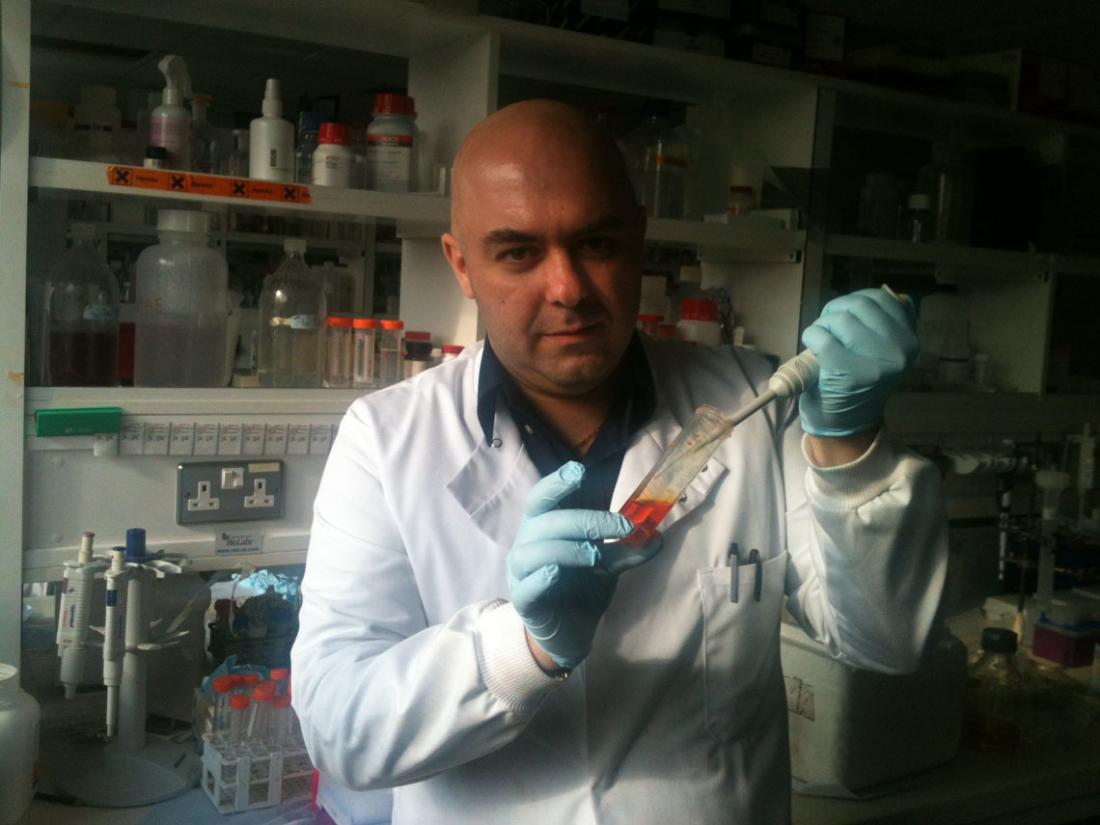Dr Michail Nomikos.
Led by CMED Assistant Professor of Biochemistry Dr Michail Nomikos, the team could start the fertilization process in the lab by injecting eggs with a higher amount of the PLC protein from the infertile men than found naturally in their sperm. These results suggest that this type of infertility could become reversible with medical assistance.
Our research aims to address and understand the complex mechanism of how such a small molecule like PLC is able to “kick-start” the generation of a new life, Dr Michail Nomikos said, adding, “This study discovered that recombinant PLC protein can successfully replace sperm and trigger development of the egg, up to the blastocyst embryo stage. This research has given hope to many couples facing problems of male infertility. We are currently developing the use of recombinant PLC protein as a therapeutic agent to treat such cases of male infertility. The research also focuses on the production of PLC antibodies, which could be used for potential clinical diagnosis of such cases of male infertility.”
Recent clinical studies have reported on infertile males with normal sperm parameters (morphology and motility), however their sperm fails to initiate fertilization. Even though their sperm can fuse with the egg, after this event, nothing happens. It was discovered that sperm from these infertile patients lack a proper functioning version of a sperm protein, called Phospholipase C zeta (PLC). Sperm PLC is essential to trigger the first stage of fertilization by initiating a process called “egg activation”. Before fertilization, the egg is in a dormant (sleeping) state and all the biological processes required for the growth and development of an embryo are on pause. Upon fertilization, when a sperm fuses with the egg, the sperm PLC protein is delivered into the egg and stimulates all the critical events of egg activation that trigger early embryo development. This sperm protein, which has been called the “spark of life” was discovered in 2002 by Chair of Cardiff University Calcium Signaling Laboratory Prof Tony Lai and his team.
A number of genetic defects in the gene encoding the PLC protein have been linked to male infertility. A recent study by Dr Jessica Escoffier and colleagues identified a new mutation (single nucleotide polymorphism - I489F) in the PLC gene of two infertile brothers from Tunisia.
The team investigated the effects of this infertility-linked PLC mutation in more detail. They found that injecting the abnormal PLC protein into mouse eggs at levels comparable with those found in the sperm of the infertile men resulted in no calcium oscillations and therefore no fertilization. However, if they increased the amounts of the protein they injected to a higher level than would be present naturally, the normal fertilization process began and calcium oscillations were observed.
“Recent clinical studies have highlighted the crucial importance of PLC in human fertilization, reporting that sperm from infertile patients, who exhibited failed fertilization even after the most powerful in vitro fertilization techniques, contained either reduced amounts or mutated forms of this protein”, Dr Michail Nomikos said.
He added: “Our ultimate goal is to use the tools that we are currently developing not only to treat, but also diagnose, the cases of male infertility associated with absent or dysfunctional PLC protein in human sperm.”
Prof Tony Lai said: “The identification and characterization of another male infertility-linked PLC mutation necessitates that we begin to consider use of recombinant PLC protein in a clinical setting, with the aim being to rescue such cases of egg activation failure. We hope that this work will lead to a PLC therapy to help couples suffering from infertility to have the chance of a family.”
ENDS
Notes to Editors:
Media enquiries to Murielle El Hajj Nahas, +974 4403 5790; [email protected]
About Qatar University:
Qatar University is one of the leading institutions of academic and research excellence in the GCC region. It provides high quality undergraduate and graduate programs that prepare competent graduates, primed to shape the future of Qatar. The organization's strong relationship with Qatari society is reflected in its community service efforts and in its vibrant research portfolio that addresses relevant local and regional challenges, advances national goals towards a knowledge-based economy, and contributes actively to the needs and aspirations of the society.



